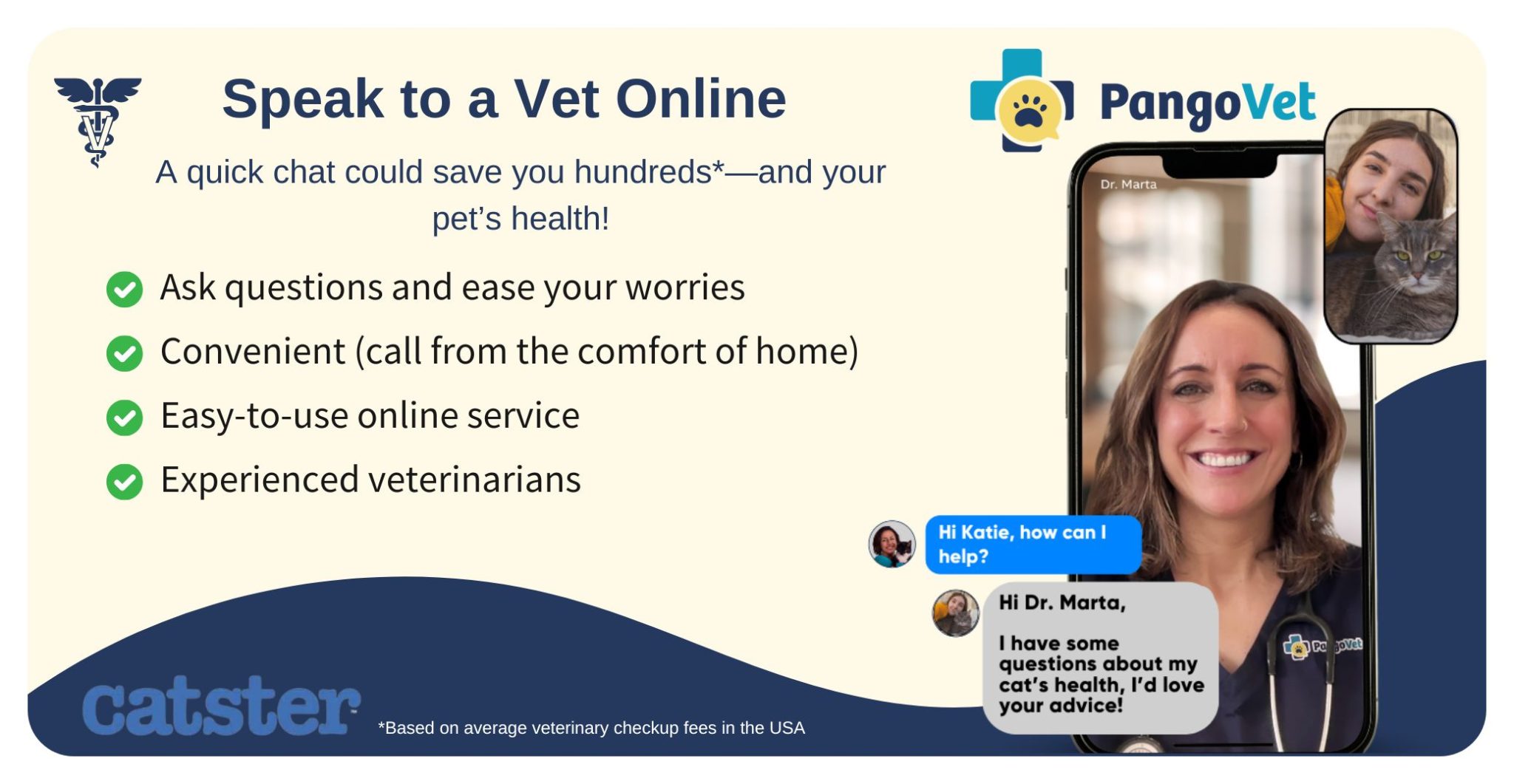
The post Ask Dr. Paola – Monday June 16, 2025 by Dr. Paola Cuevas MVZ (Veterinarian) appeared first on Catster. Copying over entire articles infringes on copyright laws. You may not be aware of it, but all of these articles were assigned, contracted and paid for, so they aren’t considered public domain. However, we appreciate that you like the article and would love it if you continued sharing just the first paragraph of an article, then linking out to the rest of the piece on Catster.com.
Welcome to our “Ask Dr. Paola” series, where every Monday we bring expert advice straight from Dr. Paola Cuevas (MVZ) to help our readers better understand their cat’s health and well-being.
Whether you’re a new pet parent or a seasoned cat lover, Dr. Paola is here to provide answers to your most pressing questions. From nutrition tips and preventive care to troubleshooting common behavioral issues, Dr. Paola is ready to offer insights that will keep your kitty happy, healthy, and feline fine. Stay tuned for expert guidance on a range of topics that matter most to you and your cat, so you can make informed decisions and provide the best possible care for your furry companion.
Have a question? Send it in here!

Help! My Feral Cat has Fleas!
“Black Magic is a feral cat and very skittish. He has a flea infestation, and I’m unable to capture him to take him to the vet for treatment. Is there anything natural I can give him to help get rid of the fleas? “– Lillian
Hi Lilian,
Thank you for caring about Black Magic, especially given how challenging it can be to help a feral, skittish cat. Flea infestations are not only uncomfortable for cats but can also lead to more serious health issues like anemia, skin infections, allergies, or tapeworm infestations. I understand the difficulty in trying to treat a cat who won’t tolerate handling, so it’s wise to consider safer, more indirect options.
Unfortunately, truly effective flea control almost always requires the use of veterinary-approved products, and natural options tend to have very limited effectiveness, especially in outdoor settings. However, you might be able to create a more manageable environment for Black Magic. Diatomaceous earth, specifically food-grade, can be lightly sprinkled in areas where he sleeps or rests. It works by drying out fleas and their eggs, but it must be used with great caution. It should never be applied directly on the cat, as it can irritate the lungs and skin. Please keep in mind that when handling diatomaceous earth, it’s important to wear personal protective equipment, particularly a mask, to avoid inhaling the dust, which can be harmful to both pets and people.
You can also try attracting him with food to a consistent feeding station and gradually introduce a safe, enclosed space like a feral cat shelter. Over time, this might allow you to place oral flea preventatives in food. Fleas have a complex life cycle that consists of eggs, larvae, pupae, and adults. Breaking that cycle effectively usually requires a product that either remains active in the cat’s system for weeks or targets multiple stages at once. Some OTC oral flea medications act quickly to kill adult fleas within hours, while others offer longer-term protection. However, most OTC oral treatments only kill adult fleas, so while they can offer quick relief from the biting adult fleas and are sometimes a helpful starting point, they are not an effective long-term solution on their own. To control immature stages like eggs and larvae, you typically need a product with an insect growth regulator (IGR), which is often found in combination products that require a veterinary prescription.
In the meantime, an online tele-triage veterinary service, such as PangoVet, could help guide you through strategies for building trust with him and planning how to safely trap and transport him when the time is right. Your commitment is truly admirable. With patience, many caregivers of feral cats have successfully turned things around, and I believe you can, too.
– Sincerely, Dr. Paola
If you need to speak with a vet but can’t get to one, head over to PangoVet. It’s an online service where you can talk to a vet online and get the advice you need for your pet — all at an affordable price!


Help! No Human’s Are Ever as Loyal as My Cats!
“Why can’t any human I know be as loving and loyal as my cats, Darwin and Breebree?“ – Michael
Hi Michael,
Thank you for allowing me to share a piece of my heart here. Please know that you are not the only one feeling like this, Michael. It’s not unusual to feel that the love and loyalty we receive from our animal companions far outweigh what we sometimes get from people. When we provide our pets, like Darwin and Breebree, with consistent kindness and respect, allowing them to feel safe and seen, they can give a kind of love that is deeply honest. Their loyalty isn’t complicated by ego or past experiences. It’s born of presence, and that kind of love, once offered, is beautifully pure. You’re not imagining it. What you feel from Darwin and Breebree is something deeply real… and in my opinion, something all of us humans are still learning how to give. I believe this is the very reason why we are here, to learn how to love truly, but the lesson is a bit more complicated for us to master. We are playing the game in so-called “hard mode,” thanks to our “monkey brains” and egos.
We humans often carry layers of emotional history and social pressure that can complicate relationships. We often get tangled in fears and projections, while our cats live in the moment, fully attuned to what’s real here and now. That’s not a flaw, just part of being human. But it can make the straightforward love from a cat feel like a sanctuary. If you ever feel alone or unsure of where you stand in the world, remember that Darwin and Breebree’s loyalty is a reflection of your own goodness. Their love is honest because you are someone worth loving. Just like Darwin, Breebree, and the rest of the sentient creatures we share our planet with, in our core we are all the same, we all wish to be safe, happy, at peace, and feel loved, respected, and accepted. I am happy that you are able to feel the love and let them be your teachers. Our cats bring us so many life lessons.
From the bottom of my heart, Dr. Paola

Help! My Cats Has Licked Her Fur Away!
“My cat Krueger is licking her fur so that her fur has disappeared. However, she does not have any hairballs. What should I do? “ – Greg
Hi Greg,
Thanks for reaching out about Krueger. When a cat is overgrooming to the point where fur is disappearing, we’re usually looking at one or more underlying causes. This behavior, known as “psychogenic alopecia” when linked to stress, can also be caused by pain, allergies, parasites like fleas (even if you don’t see them), or other skin irritations. The absence of hairballs, despite all that grooming, could suggest that the hair is being swallowed in smaller amounts or passing unnoticed in the stool, but it doesn’t rule out a medical issue.
Stress-related grooming often becomes a coping mechanism, like nail-biting in humans. However, it’s very important not to assume it’s just stress. Conditions like feline atopic dermatitis, food allergies, or even arthritis can lead cats to focus their grooming on a specific area in an attempt to relieve discomfort. At this stage, Krueger really needs to be examined in person. A veterinarian will evaluate her skin, rule out parasites, and check for signs of pain. They may also recommend allergy testing or dietary adjustments. You’re doing the right thing by noticing and asking. Catching this early gives Krueger a much better chance at a comfortable recovery.
Best, Dr. Paola
- Read last weeks questions here – June 9, 2025
- Find the full list of past articles here
- Click here to submit a question
The post Ask Dr. Paola – Monday June 16, 2025 by Dr. Paola Cuevas MVZ (Veterinarian) appeared first on Catster. Copying over entire articles infringes on copyright laws. You may not be aware of it, but all of these articles were assigned, contracted and paid for, so they aren’t considered public domain. However, we appreciate that you like the article and would love it if you continued sharing just the first paragraph of an article, then linking out to the rest of the piece on Catster.com.


